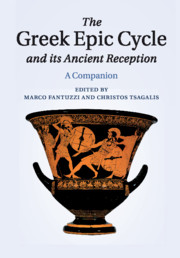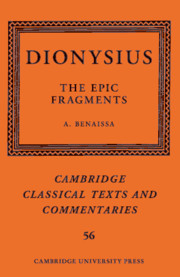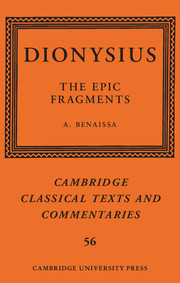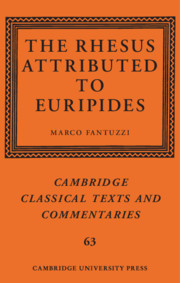The Greek Epic Cycle and its Ancient Reception
The poems of the Epic Cycle are assumed to be the reworking of myths and narratives which had their roots in an oral tradition predating that of many of the myths and narratives which took their present form in the Iliad and the Odyssey. The remains of these texts allow us to investigate diachronic aspects of epic diction as well as the extent of variation within it on the part of individual authors - two of the most important questions in modern research on archaic epic. They also help to illuminate the early history of Greek mythology. Access to the poems, however, has been thwarted by their current fragmentary state. This volume provides the scholarly community and graduate students with a thorough critical foundation for reading and interpreting them.
- Discusses in detail all the extant material (testimonia and fragments)
- Examines the formation of and role played by the Epic Cycle
- Investigates the reception and re-use of the Cyclic epics by Greek and Roman writers down to the end of the ancient world
Reviews & endorsements
'The book is beautifully produced in CUP's attractive wide-margin format. The footnotes contain helpfully abundant cross-referencing of chapters … This is an excellent and important Companion that brings together, on an unprecedented scale for this material, clear and detailed summaries of the state of play in a notably complex field of scholarship.' Lyndsay Coo, Bryn Mawr Classical Review
Product details
January 2019Paperback
9781108730266
692 pages
245 × 189 × 34 mm
1.3kg
29 b/w illus. 1 table
Available
Table of Contents
- Introduction: Kyklos, Epic Cycle, and Cyclic poetry Marco Fantuzzi and Christos Tsagalis
- Part I. Approaches to the Epic Cycle:
- 1. Coming adrift: the limits of reconstruction of the Cyclic poems Jonathan Burgess
- 2. Oral traditions, written texts, and questions of authorship Gregory Nagy
- 3. The Epic Cycle and oral tradition John M. Foley and Justin Arft
- 4. The formation of the Epic Cycle Martin L. West
- 5. Motif- and source-research: neoanalysis, Homeric and cyclic epic Wolfgang Kullmann
- 6. Meta-cyclic epic and Homeric poetry Margalit Finkelberg
- 7. Language and meter of the Epic Cycle Alberto Bernabé
- 8. Narrative techniques in the Epic Cycle Antonios Rengakos
- 9. Wit and irony in the Epic Cycle David Konstan
- 10. The Trojan war in early Greek art Thomas H. Carpenter
- Part II. Epics:
- 11. Theogony Gianbattista D'alessio
- 12. Oedipodea Ettore Cingano
- 13. Thebaid José B. Torres-Guerra
- 14. Epigonoi Ettore Cingano
- 15. Alcmeonis Andrea Debiasi
- 16. Cypria Bruno Currie
- 17. Aethiopis Antonios Rengakos
- 18. Ilias parva Adrian Kelly
- 19. Iliou persis Patrick Finglass
- 20. Nostoi Georg Danek
- 21. Telegony Christos Tsagalis
- Part III. Fortune of the Epic Cycle:
- 22. The aesthetics of sequentiality and its discontents Marco Fantuzzi
- 23. The Epic Cycle, Stesichorus, and Ibycus Maria Noussia-Fantuzzi
- 24. Pindar's cycle Ian Rutherford
- 25. Tragedy and the Epic Cycle Alan Sommerstein
- 26. The Hellenistic reception of the Epic Cycle Evina Sistakou
- 27. Running rings round Troy: recycling the 'epic circle' in Hellenistic and Roman art Michael Squire
- 28. Virgil and the Epic Cycle Ursula Gärtner
- 29. Ovid and the Epic Cycle Gianpiero Rosati
- 30. Statius' Achilleid and the Cypria Charles McNelis
- 31. The Epic Cycle and the ancient novel David F. Elmer
- 32. The Epic Cycle and Imperial Greek epic Silvio Bär and Manuel Baumbach.







